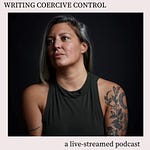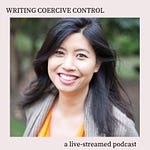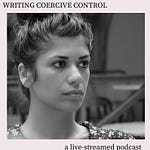Coercive control is endemic and therefore it must be cultural. If 1 in 2 women experience coercive control, it’s in our homes in childhood. How does this affect us? And how do we talk—and write—about it? This 6-part live-recorded, interactive talk series will inspire writers and readers to explore literature about coercive control in wider contexts, including state control, parent/child relationships, historical control, and control in industry and workplace. Guests include authors Sahar Delijani, Rowan Hisayo Buchanan, Winnie M Li, and Chimene Suleyman, who will discuss their experiences writing coercive control.
In this episode, Costa novel-shortlisted author Rowan Hisayo Buchanan talks about parental coercive control in her novel THE SLEEPWATCHER, a story of family, love and secrets about confronting the fact that the people you love most may not always be good or kind, and how violence can lurk in our safest and most familiar places. With host, author Abigail Tarttelin, Rowan discusses why she chose to explore control in both an intimate partner dynamic and a parent/child relationship from the perspective of the child in her latest novel.
Also, host Abigail reads from her own work-in-progress novel, ORDINARY WOMAN TURNS 30, an autofiction novel about a woman dealing with the aftermath of coercive control in an intimate partner relationship as she approaches her 30th birthday.
Follow Rowan on https://Instagram.com/rowanhisa
Rowan’s novels HARMLESS LIKE YOU, STARLING DAYS, and THE SLEEPWATCHER are available now to purchase or order through all good bookstores.
Follow Abigail as she writes her novel on Substack at abigailtarttelin.Substack.com
Send your questions and comments for the podcast to Abigail’s https://Instagram.com/abigailtarttelin_
Abigail’s novels FLICK, DEAD GIRLS, and GOLDEN BOY are available now to purchase or order through all good bookstores.
This podcast is co-produced by Abigail and Clear Lines Festival. Clear Lines started in 2015 as the UK's first festival addressing sexual assault and consent through the arts and discussion. Since then, their events have continued to promote a survivor-centered dialogue that emphasizes creativity, community, and artistic self-expression. You can check out their website with videos of past events at:
https://clearlines.org.uk/
And sign up to their newsletter to learn about upcoming events through their network:
https://clearlines.org.uk/contact-us/
They also offer a free downloadable creative writing guide for survivors of sexual violence and abuse:
https://clearlines.org.uk/our-free-creative-writing-guide-for-survivors-available-here/
This podcast is supported by Arts Council England.









Share this post